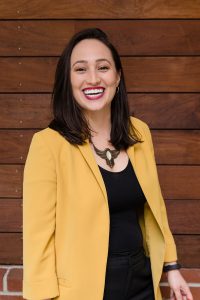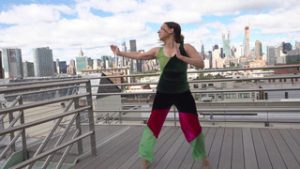BY ELIZABETH ZIMMER | When Alejandra Duque Cifuentes, Executive Director of Dance/NYC, married a fellow Colombian two years ago, the young couple were clear about their priorities. “Because we spent most of our time outside,” said Duque Cifuentes, “we chose to live in a small space, a safe haven of separation from our work.”
But the pandemic upended their lives. Her husband, a barista, was furloughed, and she found herself working from the kitchen table in their Queens studio apartment, a few blocks from the mayhem unfolding at Elmhurst Hospital Center.
“I’ve been in Rego Park throughout the entire pandemic, said Duque Cifuentes. “We were the hardest hit and have just been reclosed. Before, I used to work in the office on East 18th St. and go to shows. Now the need for our services has tripled and quadrupled. It’s in moments of crisis that we are most needed.”

Duque Cifuentes and her staff are juggling the near-obliteration of opportunities in the dance field, where intimate contact is central to performance and audiences—butts in seats—essential to the life of the field. Dance/NYC, a nonprofit organization, works in alliance with its D.C.-based national partner, Dance/USA, the national service organization for the professional dance field (learn more at danceusa.org). Dance/NYC provides five core services: advocacy, action-oriented research, technology + visibility, leadership training + networking, and grant-making. Duque Cifuentes has worked for years on measures to increase access, justice, equity, and inclusion within dance for disabled artists, immigrant artists, and artists of color in NYC’s five boroughs.
The organization’s constituency includes more than 500 nonprofit dance companies, 6,200 dancers and choreographers, and a coalition of patrons, funders, government and civic leaders, and students and educators, as well as the general public and visitors to the city. It skews young and female, and this year has been addressing the dystopian “perfect storm” of pausing for COVID-19 and struggling with issues around Black Lives Matter, white supremacy, and the utter disruption of the field of performing arts.
“At the beginning of the pandemic,” recalled Duque Cifuentes, “our program officers were having conversations [from their homes] at 8pm, 9pm, 10pm. All of the rules of engagement have changed significantly. We are not a membership-based organization, so we don’t rely on in-person events or ticket sales. In this unexpected moment, that became a strength. We did incur losses from our annual symposium [which had to go virtual], but most of the cost of that comes from foundation support. Our website is a source of earned income. With all the closure, the field has less things to promote, so there’s been a decrease.”
Duque Cifuentes further noted, from her kitchen table workstation, how her team has seen “increased support from the coronavirus dance relief fund, as we get administrative support to run it. We’ve been able to disseminate over one million dollars to individual dance workers, dance-making organizations and groups. We supported 125 organizations and groups, and over 700 individual dance workers in the metropolitan area, including New Jersey, Westchester, Suffolk, and Nassau. Typically, we serve only the metropolitan area, but this year, because of our efficiencies in grant-making, we were able to extend that support to all of New Jersey, so we were very busy!”
The application process opened in May and closed in July. “Through another program called Disability. Dance. Artistry, we made 26 grants to disabled artists in the city,” noted Duque Cifuentes. “Our activities have focused on getting resources into the hands of artists as quickly as possible. Our advocacy activities skyrocketed overnight. Our weekly field-wide calls are still taking place, for sharing resources, ideas for re-opening, advocacy activation. What can companies and artists be doing to advocate for themselves?”
The nine Chelsea-based recipients of the CRF grants include Thresh, led by choreographer Preeti Vasudevan; Abby Z and the New Utility, currently in residence at New York Live Arts; H+ Theatre of The Mind, a hip-hop troupe; Ephrat Asherie Dance, another hip-hop ensemble; Ice Theatre of New York, which performs in the rink at Chelsea Piers; and The Isadora Duncan Dance Foundation, based on W. 26th St. and currently available for outdoor shows
“This grant did not look at artistic excellence,” recalled Duque Cifuentes, whose attitude toward her constituency is that, “We recognize that you are in need and we want to support your survival.” It’s a relief grant, addressing the financial losses that the dance community has incurred. “It was about how this moment created a loss. Many groups were eligible but we didn’t have enough money. We wanted to assure that the grantee pool represented the demography of the city across geography and need.”
The grants have “allowed folks to make new work, though they weren’t required to do that,” she observed. Individual artists have received between $500 and $1,500; grants to organizations ranged from $2,500 to $5,000. One of the grants went to the Michele Brangwen Dance Ensemble, assisting in their new film production, Orchid People, which will be live-streamed Sunday afternoon at 5pm, Oct. 25 on youtube.com/brangwendance and Zoom.us.
Set on a Long Island City rooftop with spectacular views of the Manhattan skyline, the work includes live jazz by a three-man combo. After the broadcast of the 13-minute film, audiences may join a Zoom meeting for an interactive discussion of the creative process in general; preregistration is required at www.brangwendance.org.

Duque Cifuentes is especially concerned about issues around re-launching live performance in the city and elsewhere. “The field has two things that are simultaneously true,” she notes. “Its structures never have been in the service of dance workers and artists, and because of the risk to life, we should not be opening quickly; we should be thinking of the infrastructure changes we need to make to do so in a healthy way. There are other folks who are ready to dance again, to engage in activities again. We’re working with Gibney to build a crowd-sourced re-opening guide, borne out of the weekly calls. Everyone contributed to the master document, and we’re hoping to release it soon.”
Gibney, which describes itself as “a dance company, a performing arts hub, and a social action incubator,” controls a large fraction of the real estate available for dance in Manhattan, and has hosted several of Dance/NYC’s recent seminars.
“We’ve seen a return to folks being in relationship to their neighborhoods, to parks,” said Duque Cifuentes. “Very diverse people and groups are talking about their needs with each other. The divide that has existed [between large and small organizations] has slowly been bridged; there’s a huge desire for collaboration and joining forces. We have to work together; if we don’t, we’ll be forgotten. At the beginning it was clear that we’d not been considered in the city’s plan.”
So Duque Cifuentes and her colleagues got to work on #ArtistsAreNecessaryWorkers, a 12-week Facebook Live Conversation Series on Zoom, graced with simultaneous sign language interpretation and descriptive narration to serve the visually impaired. The series ran from May 21 through early August, as one strand of what she calls “the public campaign towards demanding the acknowledgement, representation, and integration of dance and arts workers into the city’s future post-pandemic.”
“The entire field collapsed in two weeks,” recalled Melanie George, a curator/dramaturge who participated in the discussion on July 20. Said Duque Cifuentes, “We did the series of conversations because it was clear that dance was being forgotten. We see this now, as the non-profit and for-profit communities come together. The one gem that has emerged has been that we have to function in community with one another, and all of us have to engage in advocacy to have a healthy community of dance.”
The series can be viewed on YouTube. Visit the organization’s website for links to the individual programs, which comprised 50 speakers and 1041 live attendees. The group was interdisciplinary, intergenerational, multicultural, and based in cities around the U.S., though the bulk of the participants were local to New York City. Its members represent both public and private-sector organizations, ranging from Ana Nery Fragoso, director of dance at the New York City Department of Education, to Griff Braun, the director of organizing and outreach at the American Guild of Musical Artists, the national labor union of dancers, singers, and stage staff across the United States; it included Lane Czaplinski, who directs the performing arts program at the Wexner Center for the Arts in Columbus, Ohio, and Linda Shelton, who directs Chelsea’s Joyce Theater. And 46 others, who populate the “executive suites” of dozens of essential companies and organizations in the arts. For the full list, go to www.dance.nyc and click on Artists Are Necessary Workers. The website is accessible in English, Chinese, Korean, and Spanish.
“The final conversation, Dance As Dignified Labor, further emphasized Dance/NYC’s commitment to advocating for dance worker rights and wellbeing,” noted Duque Cifuentes, adding, “Dance/NYC has been advising the sector that any decision it makes to reopen has to be based on accountability and reciprocity within each group of workers. Decisions have to be connected to care for each individual group. We’re trying to create a framework so when they’re ready to reopen, they have the tools to do so in a healthy way.”
For more information, to volunteer, or to contribute toward the salvation of the city’s unique, diverse dance culture, visit www.dance.nyc or call 212-966-4452.
The Dance Data Project, which tracks equity in the multi-million-dollar dance industry, will interview Ms. Duque Cifuentes in the final episode of a two-week series, discussing inclusion and services in the arts. The conversation will be available starting Fri., Oct. 30 at noon on Instagram TV, YouTube, and the DDP website, dancedataproject.com.
Chelsea Community News is made possible with the help of our awesome advertisers, and the support of our readers. If you like what you see, please consider taking part in our GoFundMe campaign (click here). To make a direct donation, give feedback, or send a Letter to the Editor, email scott@chelseacommunitynews.com.

Pingback: https://vhnbio.com
Pingback: ซื้อทราย หาดใหญ่
Pingback: hjp168
Pingback: บริษัทรับทำเว็บไซต์
Pingback: โคมไฟ
Pingback: Mostbet app
Pingback: Bilad Alrafidain
Pingback: steenslagfolie
Pingback: sex loạn luân
Pingback: rich89bet
Pingback: Hotel in Latvia
Pingback: cornhole
Pingback: พรมปูพื้นรถยนต์ toyota yaris cross
Pingback: 300 mg edible
Pingback: article
Pingback: Bk8
Pingback: ufabtb
Pingback: พนันบอล
Pingback: buy golden teacher mushroom xyz,
Pingback: Hennessy vs cognac
Pingback: cornhole stop
Pingback: Bassetti zum günstigen Preis
Pingback: Devops Service
Pingback: click for more
Pingback: sobril fass
Pingback: sbobet
Pingback: 1001webcamsex.net
Pingback: chaturbate idaaaa
Pingback: Glock
Pingback: www.glandscapingandmore.com
Pingback: ruger security 9 for sale